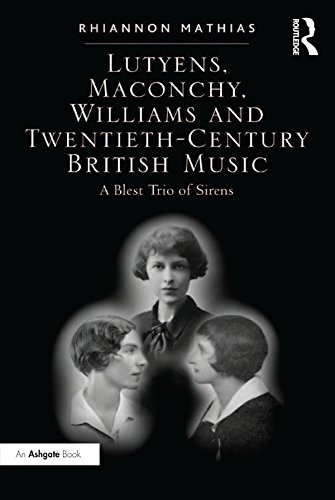Steph Power reviews Rhiannon Mathias’s Lutyens, Maconchy, Williams and Twentieth-Century British Music: A Blest Trio of Sirens.
Rhiannon Mathias’s book aims to bring to wider attention three 20th Century composers who continue to suffer varying degrees of unjustifiable neglect. Elisabeth Lutyens (1906-1983), Elizabeth Maconchy (1907-1994) and Grace Williams (1906-1977) have very little in common musically, but were contemporary, pioneering students at the Royal College of Music in the 1920s; each, however, going on to experience difficulties as a woman in gaining professional recognition despite their acknowledged talents. Mathias argues that, although ‘these women were rightly held in high esteem in the musical world’, they never quite got the opportunities or recognition they deserved, and her survey is intended to help end at last the continuing lack of public awareness of their music and their important contributions to British 20th Century musical life.
Clearly, their gender has been central to their neglect. Mathias points to crude and pervasive sexism from the ‘20s and later, typified by critic and composer Cecil Gray’s paraphrasing of Dr Johnson’s infamous dictum: ‘Sir, a woman’s composing is like a dog walking on its hind legs; it is not done well but you are surprised to see it done at all’. Alas, such attitudes have been slow to change within the classical music establishment; as recently as the mid-1980s, I myself heard the then Artistic Director of the London Sinfonietta Michael Vyner opining (not to mention whining) on national radio that ‘women can’t compose’. So – and despite her book striking a somewhat awkward balance between sociological study, biographical survey and musical analysis – Mathias is to be applauded for opening a wider debate by putting in plain terms gender issues that ultimately concern not just these three composers, but which go to the heart of musical culture well beyond the narrow enclaves of historical musicology.

Moreover, Mathias rightly contextualises the gender prejudices experienced by all three within a broader parochialism that largely prevailed throughout their lives (and, it could be argued, in many regards still exists today). She shows how attitudes within British musical institutions tended to reflect a cultural insecurity and snobbery, veering from a conservative horror of contemporary music on the one hand, to a self-conscious obedience to fashion on the other – and taking in a sentimentalised nationalism along the way. Williams, for instance, lamented that ‘when people see my…folk song arrangements and Fantasias…it is so easy for them to forget that I also write full scale serious works’. At the other end of the stylistic spectrum, Lutyens – an important pioneer of much-maligned and misunderstood serial techniques in Britain – was first perceived as too ‘advanced’, then too ‘behind’ vis-à-vis European compositional developments. Meanwhile, Maconchy simply suffered from a lack of ‘modishness – for saying the right things to the right person, or for being in the right place at the right time’, as the composer (and, coincidentally, her daughter) Nicola LeFanu put it.
This raises all sorts of important, still wider issues about how we decide – and, indeed, about who gets to decide – questions of what constitutes cultural and artistic value in society, and thence to shape the practice, distribution and history of art itself. Mathias steers well away from deeper probing of this kind and is careful even to avoid comparative musical judgements, writing in a very neutral prose and giving the three composers distinctly equal consideration. What she does do is manage to discuss a large amount of music amidst a wealth of background information, interlacing monographs of each composer within three historical periods; Part I 1926-1935 narrating student experiences, whilst Part II 1935-1955 and Part III 1955-1994 consider each composer in turn, surveying key works within their respective biographical frameworks. This approach serves well for the introduction she intended – so it is a pity that Ashgate’s ungenerous Index hardly does justice to her painstaking research and is, moreover, unforgivable in a volume priced for institutional libraries.
But there is a difficulty lurking within Mathias’s book, which no amount of diplomatic treading and balanced musical and biographical attention can circumvent, and which remains an issue for anyone daring to broach considerations of gender bias in music; and that is the thorny problem of how one gets away from the tiresome pidgeon-holing of women composers as ‘women composers’ when one has chosen to write a book that groups three composers together on the basis that they are…women composers – however sympathetic and sensitive the angle.
Of the three, arguably, the one who detested such pidgeon-holing the most – or, at any rate, the one who protested the loudest and in the ripest language to anyone who did it to her – was Lutyens; she who happened at her best – arguably again – to have composed by far the most interesting and influential music. However, what Lutyens would no doubt have appreciated about this book, is Mathias’s determination to discuss her music rather than her famously acid persona, which has hitherto inevitably proved the greater talking point. Notwithstanding feminist quibbles, for that reason alone, Rhiannon Mathias’s survey deserves to be widely read. Not only that, but she succeeds in placing Williams in a wider, British – as well as a Welsh – context and mounts a serious challenge of the music-historical ‘backwater’ category to which Maconchy in particular, but all three to varying extent, have unjustifiably been consigned for too long.
Steph Power has written regularly on classical music for Wales Arts Review.










